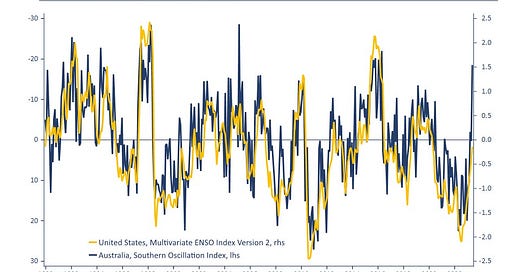Global briefing: Prigozhin/ PM Modi/ Fiscal v monetary policy/ China/ El Nino
Insights on five things that matter this week
In this week’s global briefing:
The consequences of Prigozhin: the main impact of Prigozhin’s march on Moscow is to broaden the distribution of possible outcomes for Russia and Russia/Ukraine, and likely with a slightly positive skew. The mutiny was short but will leave a lasting imprint on Russia and Ukraine.
Mr Modi goes to Washington: Prime Minister Modi’s state visit to the US reflected shifting patterns of economic and geopolitical influence. The US/India relationship is strengthening in response to shared threat perceptions of China, reinforcing the structural Indian growth story (with caveats).
Monetary policy v fiscal policy: Andy Haldane, the BIS, and Gita Gopinath made interesting, but inconsistent, macro policy contributions during the week. Calls for tight fiscal policy to support monetary policy objectives will collide with growing pressures for monetary policy to support expansionary fiscal policy.
The limits to China’s charm offensive: China’s more moderate recent tone to business and to other countries partly reflects its sluggish economic recovery. However, little has changed in China’s domestic or foreign policy and mutual de-risking continues.
El Nino as catalyst: extreme weather events are increasing, with more to come as El Nino strengthens. This will create pressure for governments to do more to reduce emissions, although in a politically constrained space. Expect more government subsidies and investment in renewables.
The full discussion follows below.
If you haven’t already, please do subscribe to receive all of my notes in full. Group and institutional subscriptions are also available. More information is available here. And do get in touch by reply email [or email here] if you would like to discuss these issues.
Elsewhere
I delivered opening remarks at a session for OECD Secretary General Mathias Cormann and senior Dutch officials yesterday on how small open economies should position for a changing global economic and geopolitical environment (competitive industrial policy, global economic fragmentation, and so on). Do get in touch if you would like to discuss or to arrange a presentation on these issues.
1. The consequences of Prigozhin



